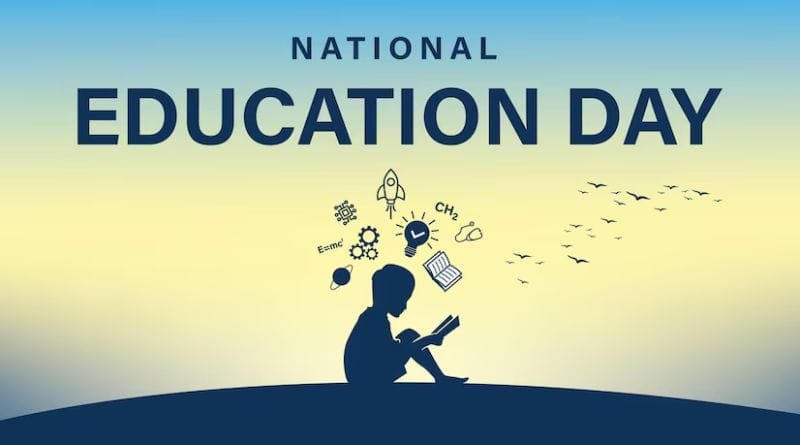
Education shapes societies, empowers individuals, and promotes sustainable progress. Every year, National Education Day serves as a reminder of these values, emphasizing the importance of access to quality education for all. This observance not only celebrates learning but also encourages initiatives that address educational challenges worldwide.
What Is National Education Day?
National Education Day is a day dedicated to raising awareness about the essential role of education in shaping individuals and communities. In India, it is celebrated on November 11 to honor the birthday of Dr. Maulana Abul Kalam Azad, India’s first Minister of Education and a visionary advocate for accessible, quality education. His contributions laid a foundation for India’s modern educational framework, making this day a meaningful occasion to acknowledge the transformative power of learning.
Across the globe, similar observances are held to highlight the importance of education, underscoring the need for initiatives that promote literacy, reduce educational inequality, and equip students with the skills needed for a rapidly changing world.
The Historical Significance of National Education Day
Dr. Maulana Abul Kalam Azad is celebrated as a key architect of India’s educational system. As an education minister, he championed policies to improve literacy, enhance the quality of learning, and provide greater access to education. His vision extended beyond basic literacy to include cultural and scientific enrichment. His belief that “education imparted by heart can bring revolution in society” continues to inspire initiatives today aimed at equitable and inclusive education.
Celebrating National Education Day on Dr. Azad’s birthday underscores the ongoing efforts to uphold his vision. Educational institutions in India mark this day with events like seminars, exhibitions, and essay competitions, while educational leaders worldwide view the day as an opportunity to discuss advancements and challenges in the field of education.
Why National Education Day Matters
National Education Day serves as a reminder that education is a fundamental human right, one that transforms lives and builds stronger societies. Educational access remains a significant challenge, especially in underserved regions where poverty, lack of resources, and social inequalities limit opportunities for learning.
Observing National Education Day encourages communities to think beyond traditional education systems and explore innovative ways to ensure everyone can learn. By focusing on issues like digital literacy, inclusive education, and lifelong learning, this day aims to inspire concrete actions to address these gaps.
For instance, recent studies show that improved literacy rates directly correlate with healthier communities and economic growth. Countries that prioritize education tend to experience lower rates of poverty and higher standards of living, highlighting the transformative power of investing in learning. As we celebrate National Education Day, it is essential to recognize these benefits and advocate for educational reforms that prioritize access and quality for all.
Key Themes of Celebrations
Several core themes often emerge in National Education Day celebrations, reflecting both the achievements and ongoing challenges in the field of education.
- Promoting STEM Education: With technology shaping the future, STEM (Science, Technology, Engineering, and Mathematics) education has become crucial for equipping students with necessary skills. National Education Day often highlights STEM programs that encourage students to explore these fields.
- Digital Literacy: As digital technologies increasingly define modern society, digital literacy is essential. Initiatives promoting digital literacy help students develop skills in using online resources responsibly and safely.
- Equal Access to Education: Ensuring educational access for marginalized groups remains a priority. This includes supporting girls’ education, students with disabilities, and individuals from economically disadvantaged backgrounds.
- Innovative Learning Methods: Educators and institutions are experimenting with innovative learning methods, including online education, experiential learning, and competency-based approaches. National Education Day provides an ideal platform for showcasing these advancements.
How National Education Day Shapes Future Generations
Education is not merely about academic achievement; it shapes the next generation’s ability to think critically, adapt, and contribute meaningfully to society. National Education Day highlights the role of education in cultivating informed citizens who are prepared to address future challenges.
As Professor Anita Narang, an education policy expert, notes, “Education is the engine of social change. When children are given the opportunity to learn and grow, they develop not only skills but also the confidence to participate in civic life.” Her perspective underscores the importance of education in shaping individuals who can lead and innovate.
By bringing attention to the value of learning, National Education Day motivates educators, students, and community leaders to advocate for policies that strengthen the quality and reach of education.
Ways to Participate
There are many ways schools, communities, and individuals can celebrate National Education Day and promote the importance of learning.
- Educational Seminars and Workshops: Schools and educational institutions can host seminars to discuss current educational challenges and share strategies for improving access to learning.
- Reading Programs and Book Drives: Communities can encourage reading by organizing book drives and donating resources to underfunded schools, libraries, or literacy programs.
- Online Campaigns: Use social media to raise awareness about National Education Day, sharing stories, statistics, and quotes that underscore the value of education.
- Volunteering and Tutoring: Individuals can volunteer at local schools or community centers, offering support as tutors or mentors to help students in need of additional learning assistance.
- Engaging in Community Discussions: Organize discussions around key topics in education, inviting parents, teachers, and local leaders to exchange ideas on how to foster a culture of learning.
Each of these actions, whether big or small, can contribute to the ongoing movement for educational equality and improvement.
Conclusion
National Education Day reminds us that education is a cornerstone of personal growth, social progress, and economic development. By reflecting on the value of learning, we acknowledge the role education plays in shaping our communities and the world at large.
As we celebrate this day, let’s commit to promoting access to quality education for all, supporting initiatives that address gaps in learning, and advocating for policies that make education more inclusive. National Education Day is not only a tribute to historical figures but a call to action for everyone who believes in the transformative power of education.



